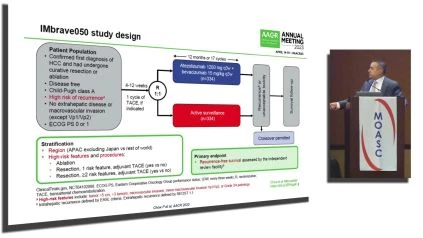Discover the latest advancements in the field of Hepatobiliary Cancers in this comprehensive session titled “Hepatobiliary Cancers Therapeutic Updates” featuring the esteemed Anthony El-Khoueiry, MD. As the Associate Director for Clinical Research and Phase 1 Program Director at the prestigious USC Norris Comprehensive Cancer Center, Dr. El-Khoueiry brings his expertise to illuminate the cutting-edge developments in the treatment of hepatobiliary cancers.
This session delves into critical topics that are reshaping the landscape of hepatobiliary cancer therapies. The intricate relationship between financial relationships and medical research is explored, with disclosures revealing collaborations with notable companies such as Astex, Astrazeneca, Fulgent, and Auransa. In addition, Dr. El-Khoueiry’s active involvement as a consultant and advisor to industry leaders including Merck, BMS, Roche/Genentech, Exelixis, and others underscores his pivotal role in shaping the therapeutic landscape.
With a focus on evidence-based medicine, the session opens with insights into when systemic therapy is indicated for Hepatocellular Carcinoma (HCC), citing the seminal work of Reig M et al. in the Journal of Hepatology 2022. A historical snapshot of treatment strategies is provided, showcasing the evolution from single-agent TKIs to immunotherapy (IO) and IO-based combinations. The impact of landmark studies such as SHARP, REFLECT, IMbrave150, and HIMALAYA is dissected, shedding light on pivotal advancements in HCC treatment.
IMbrave150, a groundbreaking study designed by Finn et al. and published in the New England Journal of Medicine 2020, is meticulously examined. This trial explored novel therapeutic avenues for locally advanced or metastatic HCC and revealed key eligibility criteria, co-primary endpoints, secondary endpoints, and survival follow-up metrics. The innovative combination of atezolizumab and bevacizumab, representing a paradigm shift in HCC therapy, takes center stage in this illuminating discussion.
The HIMALAYA study, a global Phase 3 trial, is presented with detailed insights into the patient population, eligibility criteria, and stratification factors. Through this study, the efficacy of novel treatments for uHCC patients is highlighted, with a focus on BCLC stage B and stage C. The significance of primary tumor location and etiology of liver disease in treatment strategies is emphasized.
The session explores the critical question of whether single-agent PD-1/PD-L1 inhibitors have a role in first-line HCC treatment. Key studies including Checkmate 459, Himalaya, and Rationale-301 are analyzed, showcasing both positive and negative outcomes. This discussion underscores the importance of tailored treatment options for different patient profiles, providing clinicians with invaluable insights for decision-making.
Delving deeper into patient care, considerations for first-line systemic therapy are outlined, providing practical guidance for managing advanced HCC. Patient profiles are examined based on factors such as convenience of oral therapy, symptomatic presentation, tumor burden, contraindications, and risk assessment. The potential of combination therapies and the use of single-agent PD-1 inhibitors are explored in the context of varying patient scenarios.
The session takes an informative turn as Dr. El-Khoueiry presents updates on Early-Stage HCC and the role of adjuvant therapy, adding a comprehensive perspective on different stages of hepatobiliary cancer management. Real-world patient cases provide a clinical dimension, with vivid descriptions of patients’ experiences, symptoms, and responses to treatment. This human element serves to bridge the gap between research and patient care, highlighting the significance of therapeutic updates in improving patients’ lives.
The evolving treatment landscape of Cholangiocarcinoma is explored, dissecting targetable gene alterations that open up exciting possibilities for targeted therapies. Prevalence rates of alterations such as FGFR2 fusions, IDH1/2 mutations, BAP1 alterations, and more are outlined, offering a glimpse into the potential of precision medicine in treating these challenging cancers.
The session culminates with a landscape of targeted therapies for biliary duct cancers, spotlighting promising agents such as Infigratinib, Ivosidenib, Zanidatinab, Dabrafenib/Trametinib, and more. The ongoing efforts to refine treatment strategies for these complex cancers are evident, setting the stage for a brighter future in the field.
In summary, this session provides a holistic and insightful overview of Hepatobiliary Cancers Therapeutic Updates, presented by the esteemed Anthony El-Khoueiry, MD. With a balanced blend of research findings, clinical experiences, and potential therapeutic avenues, the session equips healthcare professionals with the knowledge needed to navigate the complex landscape of hepatobiliary cancer treatment, ultimately leading to improved patient outcomes and quality of life.

